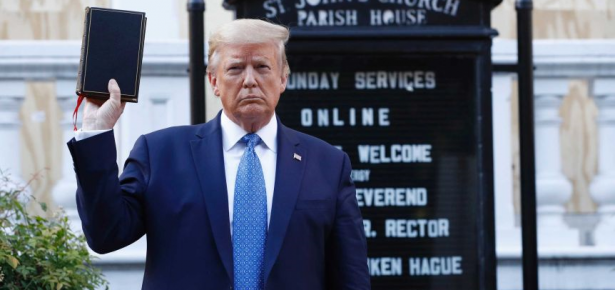
The coming to power of Donald Trump has sparked heated debate between pundits and academics about the consequences of right-wing populism in the United States and beyond. Although there’s little doubt that Trump’s populism represents a democratic threat, at the same time there’s no agreement on the extent to which US democracy is strong enough to survive this challenge. Broadly speaking, one can identify two strands in the academic literature. On the one hand, not a few scholars are of the view that Trump’s administration should be seen as a major danger, since it is gradually subverting the liberal democratic regime from within and employing toxic practices that could very well lead to authoritarian rule. On the other hand, several academics argue that the US political system is characterized by a series of institutional checks and balances that are so robust that Trump’s presidency, volatile as it is, cannot cause American democracy significant damage.
Despite important differences in the thinking of these two strands, they share one important connection: the idea that the potential success of Trump’s right-wing authoritarian agenda hinges on an exogenous opportunity – an unforeseen event from outside – which might allow the government to bypass the liberal democratic rules of the game. Unfortunately for US democracy, the pandemic represents just such an external variable. The spread of COVID-19 through the country is an unexpected phenomenon with devastating economic and political consequences. Unemployment is now reaching levels unseen since the Great Depression, poverty is rising rapidly, and there would seem to be no prospects for a fast economic fix. At the same time, the Trump administration has dealt with the pandemic abysmally, to the point that more than 100,000 people have died; while the erratic behavior of the president himself has done anything but help contain the virus’ spread. Additionally, we are now witnessing a conflagration of nationwide protests over the death of George Floyd, an African-American man asphyxiated by white police officers in Minneapolis.
One might think that the dire situation in which the country finds itself ought to lead to the weakening of Trump, who will be forced to moderate his policies and therefore change his agenda. However, comparative evidence for other cases of populist rule reveal that crises are actually opportunities that may be employed by right-wing populist forces not only to radicalize instead of moderate their positions, but also to push for harsher measures that in effect condemn democracy to death. Several worrying signs indicate that in the United States this might already be taking place. Despite the clear ineptitude of the government in dealing with the pandemic, by speaking about “the greatest comeback ever” Trump is developing a message of pushback propaganda that seeks to boost his approval ratings amongst Republican voters. What’s more, he spares no effort in advancing conspiracy theories about the virus’ origins that seek to blame foreign influences – from China to the WHO – for the critical situation in which the country finds itself. Last but not least, his response to the present wave of angry protest shows that he is more than willing to restrict the freedoms of a press that he despises and employ iron-fist policies.
In short, the United States has reached tipping point; and this is a pivotal moment that Trump will certainly try to use for his own ends and benefit. Widespread counter-mobilization is already happening, but the pandemic gives Trump an unparalleled opportunity – the excuse and the cover that he needs – to violate liberal norms and override political opposition. The country is at a perilous crossroads, and democracy itself is at stake. Optimists may point out that the election is held in November and that both the dramatic economic situation and incompetent management of the pandemic will surely lead to Trump’s defeat. Nevertheless, electoral competition is an uphill struggle for the opposition since the government will continue to pressurize opponents and the pandemic makes campaigning difficult. For the sake of US democracy and of liberalism worldwide, one must hope fervently that the Democrats win this election. Painful as it is for liberals of all stripes to contemplate, this is however an unlikely outcome. Trump is using the pandemic to position himself as the providential savior from a looming catastrophe. And although there’s more than enough evidence to show that his management of the pandemic has been awful, he can still use this crisis to energize his base and attack the opposition relentlessly. His reelection, when it happens, will be considered by himself as a clear sign that the times are ripe for more in the way of authoritarian rule. If this prediction comes true, COVID-19 can be thought of not only as the bringer of death and recession to America but also as the harbinger which enabled the destruction of US democracy.
Latest Comments
Have your say!